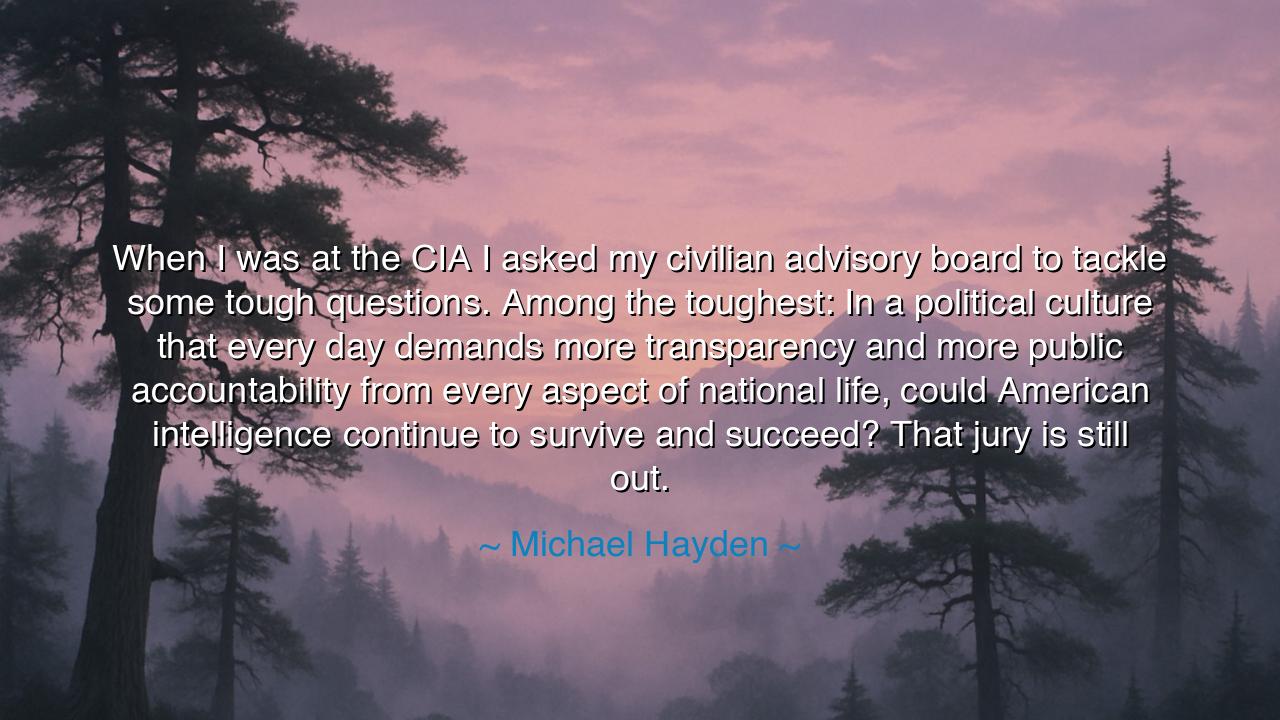
When I was at the CIA I asked my civilian advisory board to
When I was at the CIA I asked my civilian advisory board to tackle some tough questions. Among the toughest: In a political culture that every day demands more transparency and more public accountability from every aspect of national life, could American intelligence continue to survive and succeed? That jury is still out.






The words of Michael Hayden, former Director of the Central Intelligence Agency, ring with the gravity of a man who has walked the knife’s edge between secrecy and truth, between the shield of national defense and the light of public scrutiny: “When I was at the CIA I asked my civilian advisory board to tackle some tough questions. Among the toughest: In a political culture that every day demands more transparency and more public accountability from every aspect of national life, could American intelligence continue to survive and succeed? That jury is still out.” Beneath these words lies a question as old as civilization itself — how can power and secrecy coexist with democracy and freedom? Hayden’s reflection is not merely about government; it is about the soul of nations and the fragile balance between security and openness.
The origin of this quote reaches into the very heart of the modern age — an era in which the shadows of the Cold War gave way to the blinding glare of the digital world. Hayden, who served at a time when intelligence agencies faced unprecedented exposure through leaks, surveillance debates, and global scrutiny, speaks from the battlefield of information itself. The old world of silent agents and whispered codes had collided with a new reality: one of instant communication, mass media, and public demand for transparency. In such an age, the secret becomes scandal, and the unseen act of protection becomes an accusation of intrusion. Hayden’s words thus capture the agony of a system built to work unseen now forced to exist under a magnifying glass.
When he asks whether intelligence can “survive and succeed” in a culture that prizes transparency, Hayden is not lamenting progress, but warning of paradox. For intelligence thrives in silence. Its victories are invisible, its sacrifices unspoken. A spy prevents a war, but no song is written for him. An analyst unravels a plot, but her name is never known. Theirs is a calling where success demands anonymity and failure courts disgrace. Yet in the modern republic, where citizens cry for accountability and truth, this sacred silence becomes suspect. Hayden’s question is not whether secrecy is right or wrong, but whether it can still exist in an age that distrusts the unseen.
History too has wrestled with this dilemma. In the twilight of the Roman Republic, the Senate established the secret committees that managed the defense of the empire. Their purpose was noble — to protect the state from foreign intrigue — yet their secrecy bred both suspicion and resentment. The philosopher Cicero, who served as consul, understood the need for hidden counsel in matters of war but warned that “a republic must guard its virtue as much as its borders.” In other words, secrecy without virtue becomes tyranny, and transparency without restraint becomes chaos. Hayden stands in this same lineage of thought, inheriting the eternal question: how can a free people entrust their security to secrecy without losing their faith in freedom itself?
The modern intelligence officer faces an even greater trial than Cicero could imagine. In an age of data and digital exposure, information itself is both weapon and weakness. Hayden’s reflection came at a time when classified programs — from surveillance operations to covert missions — were laid bare to the public through whistleblowers and leaks. The world cheered transparency, but few understood the cost: alliances endangered, sources exposed, and enemies emboldened. The people demanded to see, but in seeing, they sometimes weakened their own shield. Hayden’s question thus becomes prophetic — not about institutions alone, but about the fate of truth in an era of noise.
Yet even as he speaks of uncertainty — “that jury is still out” — there is in Hayden’s tone a quiet resilience. For he knows that intelligence, like civilization itself, must evolve or perish. The path forward, he suggests, lies not in absolute secrecy nor in reckless transparency, but in balance — the delicate art of keeping faith with both the public and the mission. The intelligence community must find ways to preserve the trust of the people without baring its soul to the world. This is not cowardice, but stewardship: to hold the secrets that guard life, while answering to the conscience that guides liberty.
So, my children, the lesson of Hayden’s words is this: every age must rediscover the harmony between truth and silence. There are truths that enlighten and truths that endanger, and wisdom lies in knowing which to reveal and which to guard. In your own life, you too will face this trial — when to speak, and when to hold your counsel. Do not mistake secrecy for deceit, nor transparency for virtue. The wise soul knows that clarity without discretion is blindness, and discretion without conscience is corruption.
In the end, Michael Hayden reminds us that freedom and security are not enemies, but partners — bound together by trust. The survival of both depends not on how loudly we demand to know, but on how wisely we choose to understand. The jury is still out, yes — but the verdict will be written not by governments alone, but by the hearts of a people mature enough to see that even in the age of light, some shadows must remain, not for fear, but for the safety of all.






AAdministratorAdministrator
Welcome, honored guests. Please leave a comment, we will respond soon